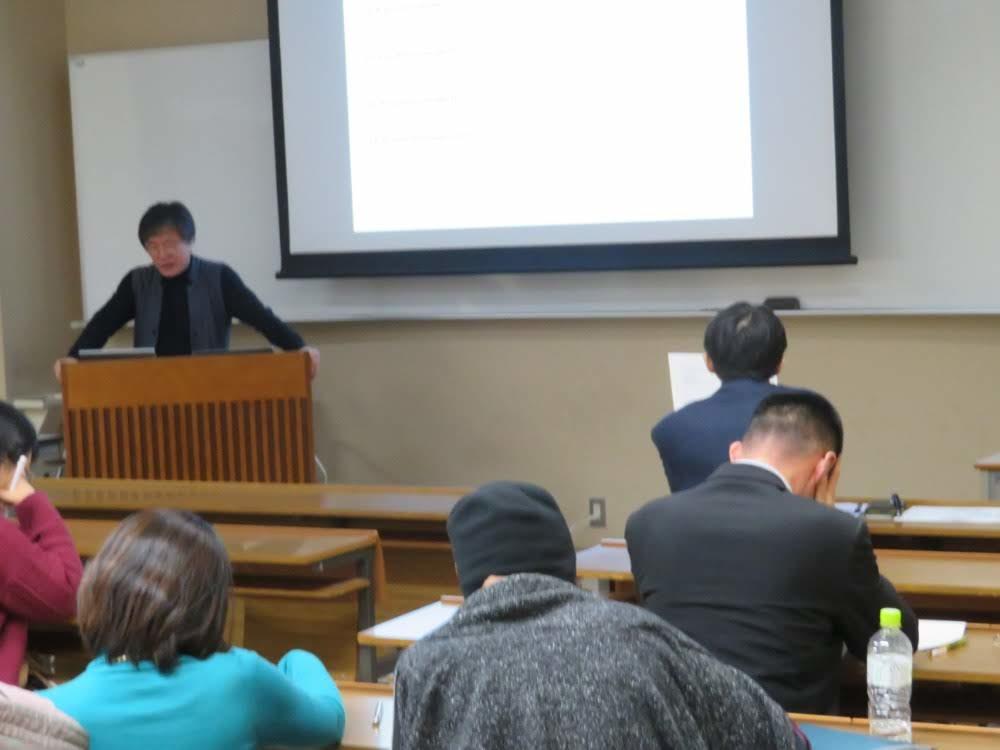Date & Time: Thursday, January 24, 2019 5:40 - 7:10 pm
Venue: Room 102, Research and Lecture Building, Tokyo University of Foreign Studies
Speaker: Dr. Yongkyu Chang (Visiting Professor, Graduate School of Asian and African Area Studies, <ASAFAS>, Kyoto University, Japan / Director, Institute of African Studies, Hankuk University of Foreign Studies <IAS-HUFS>, South Korea)
Theme: "A system of knowledge in action": The Logical Process and Cognitive interpretation of Zulu divination
Report:
 Professor Yongkyu Chang, Director of Institute of African Studies-Hankuk University of Foreign Studies, on invitation by African Studies Center at Tokyo University of Foreign Studies (ASC-TUFS), delivered a public lecture titled: "A System of Knowledge in Action: The Logical Process and Cognitive Interpretation of Zulu Divination." Professor Chang informed the gathering that, the study of divination has a variety of research fields from the phenomenon of spirit possession to symbolism and the logic of divination, and from the structural functionalism to cognatic and interpretative anthropology. Professor Chang also stated that, divination is a mystically-driven problem-solving mechanism in which human agents and spirits are actively involved, and that divination is commonly found in Africa with various patterns and practices. Professor Chang supposed that divination requires the collaboration of a diviner, and clients, in order to reach at the satisfactory result.
Professor Yongkyu Chang, Director of Institute of African Studies-Hankuk University of Foreign Studies, on invitation by African Studies Center at Tokyo University of Foreign Studies (ASC-TUFS), delivered a public lecture titled: "A System of Knowledge in Action: The Logical Process and Cognitive Interpretation of Zulu Divination." Professor Chang informed the gathering that, the study of divination has a variety of research fields from the phenomenon of spirit possession to symbolism and the logic of divination, and from the structural functionalism to cognatic and interpretative anthropology. Professor Chang also stated that, divination is a mystically-driven problem-solving mechanism in which human agents and spirits are actively involved, and that divination is commonly found in Africa with various patterns and practices. Professor Chang supposed that divination requires the collaboration of a diviner, and clients, in order to reach at the satisfactory result.
Moreover, Professor Chang indicated that, Manguzi is a small village of Ingwavuma district of KwaZulu-Natal province, which is located in Northern part of the province. Professor Chang said, the people adopted Zulu cultural and societal elements as the result of the migration and urbanization, and the influence of Mozambican divination which is widely observed in the village, and Mozambican diviners are generally known as powerful diviners. Professor Chang further opined that, divination in Manguzi has been massively influenced by South Mozambican divination, Ukufemba. In Manguzi and eNgozini, Professor Chang added that, there are two major divination method that is practice, the Ukubhula Ngathambo (a bone throwing divination) and Ukufemba (a divination by spirit possession). Professor Chang stated that, Ukubhula's divining spirit is ngoma, a local lineage spirit but, Ukufemba is known as the most powerful divination in the area because Ndawo spirit is directly present on the séance, while the ngoma spirit are always hidden somewhere and represented by divining objects. Professor affirmed that, Manguzi and South Mozambique in particular, share the same pattern of divination, which he termed, Ngoma-Ndawo Alliance.
In his concluding statement, Professor Chang pointed out that, a divining consultation is not always accepted by clients and there is a contestation between a diviner and clients which has to be overcome in order to reach a conclusion. Also, Professor Chang stipulated that, divination is a system of knowledge in action given that, it utilizes all the meaningful information shared by a diviner and clients in order to meet a satisfactory result, and the concept of knowledge should be focused on the process of revealing and constructing truth rather than accepting the authorized and established one.

